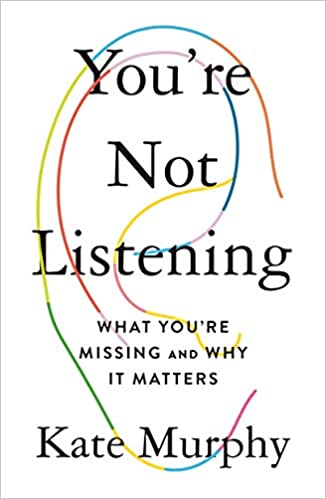“Listening is like playing a sport or musical instrument in that you can get better and better with practice and persistence, but you will never achieve total mastery. Some may have more natural ability and some may have to try harder, but everyone can benefit from making the effort.“
Print | Kindle(eBook) | Audiobook
The average person suffers from three delusions; we believe we are good drivers, good listeners, and think we have a good sense of humor. You’re Not Listening is a book in praise of listening and a lament that, as a culture, we seem to be losing our listening mojo.
Listening is more of a mindset than a checklist of dos and don’ts. It’s a very particular skill that develops over time by interacting with all kinds of people—without agenda or having aides there to jump in if the conversation goes anywhere unexpected or untoward.
Here are my favourite take-aways from reading, You’re Not Listening:
Praise for Listening
Listening is something you do or don’t do every day. While you might take listening for granted, how well you listen, to whom, and under what circumstances determines your life’s course—for good or ill. And, more broadly, our collective listening, or the lack thereof, profoundly affects us politically, societally, and culturally. We are, each of us, the sum of what we attend to in life.
To listen is to be interested, and the result is more interesting conversations. The goal is to leave the exchange having learned something. You already know about you. You don’t know about the person with whom you are speaking or what you can learn from that person’s experience
The soothing voice of a mother, the whisper of a lover, the guidance of a mentor, the admonishment of a supervisor, the rallying of a leader, the taunts of a rival are what form and shape us. And to listen poorly, selectively, or not at all is to limit your understanding of the world and deprive yourself of becoming the best you can be.
“People used to listen to one another while sitting on front porches and around campfires, but now we are too busy, or too distracted, to explore the depths of one another’s thoughts and feelings”
Listening heightens your awareness. It makes you feel. As you become more attuned to the thoughts and emotions of others, you become more alive to the world and it becomes more alive to you. Life otherwise can become a muted existence, with days spent cocooned in unquestioned beliefs and fixed concepts, where, even though the world and the people in it are always changing, nothing is ventured beyond the borders of what you already know or accept as true. It feels safe, but it’s really just stifling.
We overestimate what we already know and, mired in our arrogance, remain unaware of all we misunderstand. We also fear that if we listen too carefully, we might discover that our thinking is flawed or that another person’s emotions might be too much to bear. And so we retreat into our own heads, talk over one another, or reach for our phone.
Types of Responses:
- Shift response, which directs attention away from the speaker and toward the respondent. Support response, which encourages elaboration from the speaker to help the respondent gain greater understanding.
- Good listeners are all about the support response, which is critical to providing the kind of acknowledgment and evaluative feedback.
Lonileness Epidemic
People get lonely for lack of listening. Psychology and sociology researchers have begun warning of an epidemic of loneliness in the United States. Experts are calling it a public health crisis, as feeling isolated and disconnected increases the risk of premature death as much as obesity and alcoholism combined. The negative health impact is worse than smoking fourteen cigarettes per day. Indeed, epidemiological studies have found links between loneliness and heart disease, stroke, dementia, and poor immune function.
The UK was moved in 2018 to appoint a “minister for loneliness” to help its 9 million citizens who often or always feel lonely.
Listening is about the experience of being experienced. It’s when someone takes an interest in who you are and what you are doing. The lack of being known and accepted in this way leads to feelings of inadequacy and emptiness. What makes us feel most lonely and isolated in life is less often the result of a devastating traumatic event than the accumulation of occasions when nothing happened but something profitably could have. It’s the missed opportunity to connect when you weren’t listening or someone wasn’t really listening to you.
90-9-1 rule
The 1 percent rule, or 90-9-1 rule, of internet culture holds that
- 90 percent of users of a given online platform (social media, blogs, wikis, news sites, etc.) just observe and do not participate,
- 9 percent comment or contribute sparingly,
- and a scant 1 percent create most of the content.
- While the number of users contributing may vary somewhat by platform, or perhaps when something in the news particularly stirs passions, the truth remains that the silent are the vast majority.
In a culture infused with existential angst and aggressive personal marketing, to be silent is to fall behind. To listen is to miss an opportunity to advance your brand and make your mark.
Listening takes Effort
None of us are good listeners all the time. It’s human nature to get distracted by what’s going on in your own head. Listening takes effort. Like reading, you might choose to go over some things carefully while skimming others, depending on the situation. But the ability to listen carefully, like the ability to read carefully, degrades if you don’t do it often enough. If you start listening to everyone as you would scan headlines on a celebrity gossip website, you won’t discover the poetry and wisdom that is within people. And you withhold the gift that the people who love you, or could love you, most desire.
Closeness-Communication Bias (See-Finish Naija Slang lol)
We actually all tend to make assumptions when it comes to those we love. It’s called the closeness-communication bias. As wonderful as intimacy and familiarity are, they make us complacent, leading us to overestimate our ability to read those closest to us.
“A happy marriage is a long conversation that always seems too short.” – André Maurois
In conversation, people rarely tell you something unless it means something to them. It comes to mind and out of their mouths because it has valence, begging for a reaction. And it’s in understanding the intent and meaning beneath the words that you relate to that person.
Listening helps you understand people’s mind-sets and motivations, which is essential in building cooperative and productive relationships as well as knowing which relationships you’re better off avoiding.
Listening to Opposing Views
To listen does not mean, or even imply, that you agree with someone. It simply means you accept the legitimacy of the other person’s point of view and that you might have something to learn from it. It also means that you embrace the possibility that there might be multiple truths and understanding them all might lead to a larger truth. Good listeners know understanding is not binary. It’s not that you have it or you don’t. Your understanding can always be improved.
Conversational Sensitivity
People who have conversational sensitivity not only pay attention to spoken words, they also have a knack for picking up hidden meanings and nuances in tone. They are good at recognizing power differentials and are quick to distinguish affectation from genuine affection. They remember more of what people say and tend to enjoy, or at least be interested in, the conversation.
“Conversational sensitivity is also thought to be a precursor to empathy, which requires you to summon emotions felt and learned in previous interactions and apply them to subsequent situations.”
Self-Awareness
Research indicates that people who have a higher degree of self-awareness, and a related concept known as self-monitoring, are better listeners in part because they know the sorts of things that lead them to jump to the wrong conclusions and thus are less likely to do so. Cultivating self-awareness is a matter of paying attention to your emotions while in conversation and recognizing when your fears and sensitivities—or perhaps your desires and dreams—hijack your ability to listen well.
“You can only be as intimate with another person as you are with yourself.”
Listening to your Inner Voice
The research suggests that the more people you listen to in the course of your life, the more sides to an issue you can argue in your head and the more solutions you can imagine. Inner dialogue fosters and supports cognitive complexity, that valuable ability to tolerate a range of views, make associations, and come up with new ideas.
Figuring out Life
The stories we collect in life define us and are the scaffolding of our realities. Families, friends, and coworkers have stories that bind them together. Rivals and enemies have narratives that keep them apart. All around us are people’s legends and anecdotes, myths and stark realities, deprecations and aggrandizements. Listening helps us sort fact from fiction and deepens our understanding of the complex situations and personalities we encounter in life. It’s how we gain entrée, gather intelligence, and make connections, regardless of the social circles in which we find ourselves.
“No mortal can keep a secret. If his lips are silent, he chatters with his fingertips; betrayal oozes out of him at every pore.” – Sigmund Freud
The Value of Silence and Pausing
To be a good listener is to accept pauses and silences because filling them too soon, much less preemptively, prevents the speaker from communicating what they are perhaps struggling to say. It quashes elaboration and prevents real issues from coming to the surface. Just wait. Give the other person a chance to pick up where they left off.
You get so much more out of interactions when you allow people the time and space to gather their thoughts.
Recorded Gossip
We are socialized by the gossip we hear from our families, friends, colleagues, teachers, and religious leaders. What are the Jesus parables and Buddha stories but recorded gossip? Dutch researchers found that listening to positive gossip made people try to behave in a similar way, and negative gossip made people feel better about themselves.
Listening is often regarded as talking’s meek counterpart, but it is actually the more powerful position in communication. You learn when you listen. It’s how you divine truth and detect deception. And though listening requires that you let people have their say, it doesn’t mean you remain forever silent. In fact, how one responds is the measure of a good listener and, arguably, the measure of a good person.
All the best in your quest to get better. Don’t Settle: Live with Passion.



1 Comment
Pingback: 100 Books Reading Challenge 2021 – Lanre Dahunsi